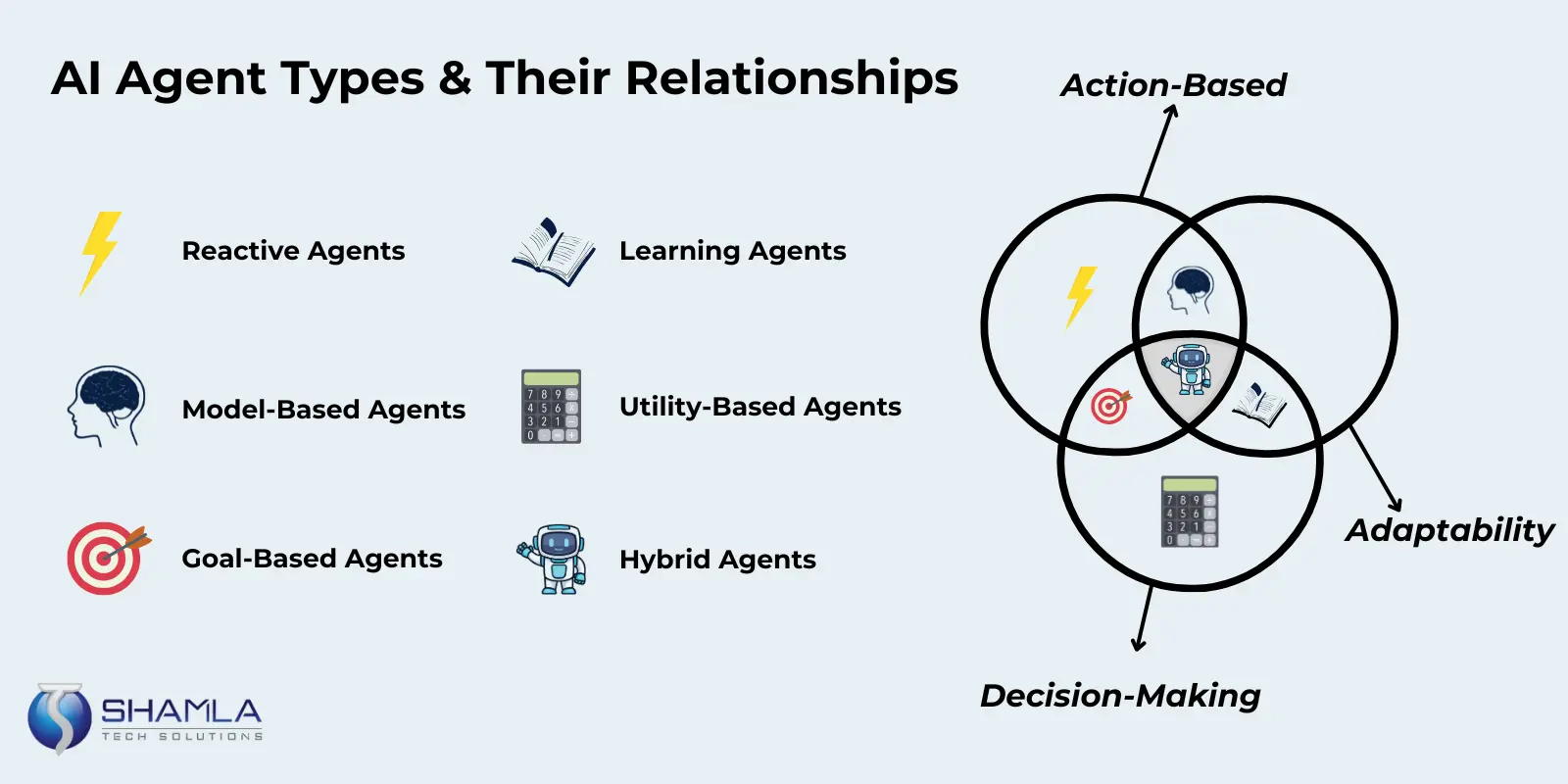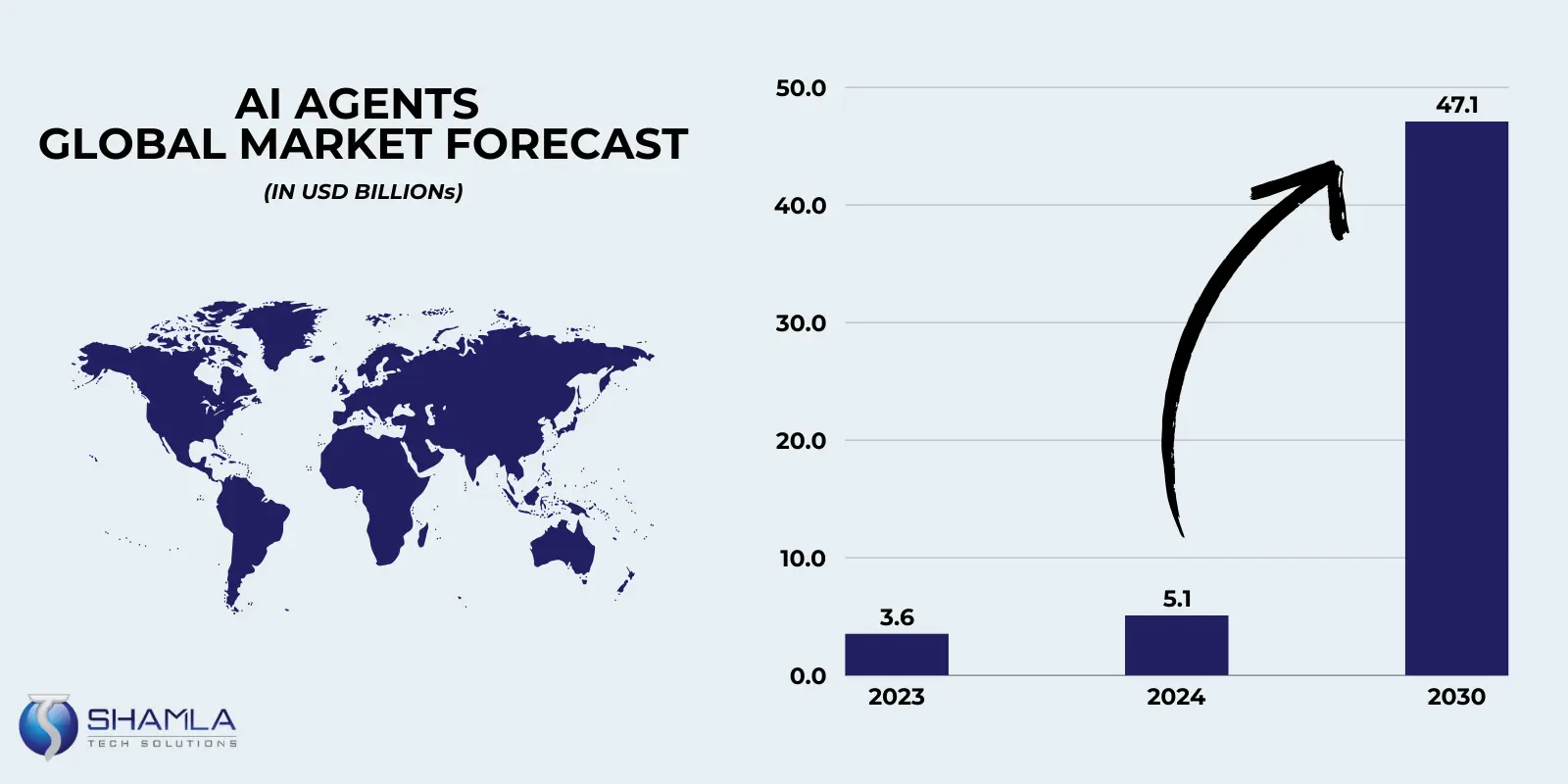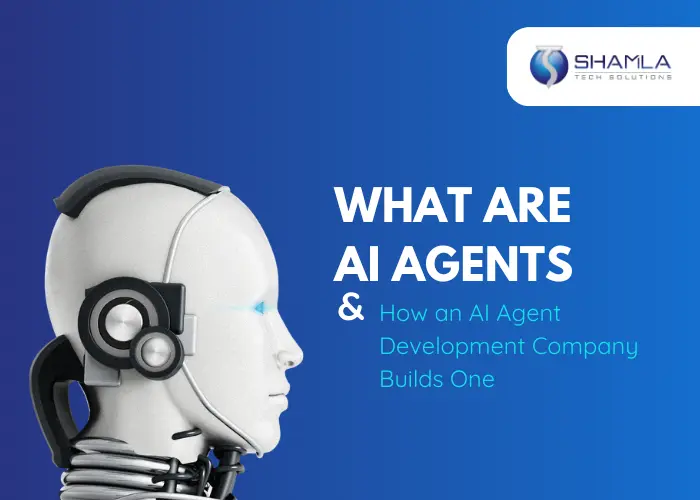What are AI Agents?
Types of AI Agents

1. Simple Reactive Agents
2. Model-Based Agents
3. Goal-Based Agents
4. Utility-Based Agents
5. Learning Agents
6. Hybrid Agents
What do AI Agents do?
AI agents are made to interact with their surroundings and do tasks on their own, copying how humans act in certain areas. These agents collect data from the environment, look at it carefully, and then take actions to reach set goals. In customer service, AI agents can be used effectively to help your users by giving quick answers to their questions, solving problems, and even suggesting products which will be done based on what the customer preferably likes. This reduces the need for humans to be involved all the time in these kinds of operations and makes businesses run more smoothly.
In online shopping, AI agents are used more and more to make the shopping experience better and to help businesses sell more. These agents look at how customers act, guess what they might want to buy, and suggest products that fit. This kind of personal touch helps businesses sell more and keeps customers happy. AI agents can also help with managing stock by checking how much is left, predicting what will be needed, and telling businesses if there might be too little or too much stock. By making these tasks easier, companies can focus on bigger decisions and make more money.
AI agents are now also improving healthcare by helping providers with diagnosing problems and planning treatments in a much more efficient way than we actually thought. These agents can be deployed to scan the medical images that are taken, to check any early symptoms which can help providers to come up with solutions for health problems much faster and more accurately than humans can. Also, AI systems can help doctors choose the best treatments based on a patient’s history and current information. These agents help doctors make better and faster decisions, leading to better care for patients.
In finance, AI agents help detect fraud, manage risks, and improve customer service. They constantly check financial transactions, looking for unusual things that could mean fraud. They can also study market trends, giving investors helpful information to make smart decisions. In banks, AI agents help customers with things like checking their balance and making transactions, offering help at any time and improving the customer experience.
Finally, AI agents are making workplaces much better than they were before by taking care of everyday office tasks, allowing human workers to focus on more creative and complex jobs that they already have. Tasks like entering data, making schedules, and handling documents can be done by AI agents quickly and accurately. They can even learn new ways of doing things, making it easier for businesses to change as they grow. This helps companies get more done, lower costs, and create a better work environment where people can be more creative.
The Growing Market for AI Agents

The market for AI agents is growing really fast, and it’s clear that they are becoming a big part of the market across many industries. In 2024, the global AI market is worth about $5.1 billion, and it’s expected to grow at a fast rate of over 44.8% each year until 2030. This shows that AI agents are quickly going from being a new technology to a common tool used by businesses all over the world.
AI agents are used in many fields, like customer service, healthcare, online shopping, finance, and education. Chatbots in customer service are now becoming very common, with many companies starting to use them to answer frequent customer questions, fix problems, and give information all the time. In healthcare, AI agents are helping doctors analyze the medical data to get better help with diagnoses, and suggest treatments, making healthcare much faster and easier to access. In online shopping, they can now recommend products based on what customers do in the website or the app and help manage stock levels according to the demand.
In business, AI agents are also helping companies automate simple tasks, which allows workers to focus on more important jobs. This makes businesses more productive and helps save money.
As AI technology keeps getting better, we’ll get to see more ways to use AI agents. They will become smarter, able to do more complicated tasks, and even learn from their experiences to do their jobs better over time. As more businesses see the benefits, the market for AI agents will keep growing and changing industries all around the world.
How to Build an AI Agent Customized for Your Business?
1. Identify Business Needs and Objectives
The first step is to clearly define the problem you want to solve with the AI agent. Look closely at your business processes and find areas where AI can help, whether through automation, better decision-making, or improving customer interactions. Set clear goals, like reducing costs, increasing efficiency, or improving customer experiences.
At this point, decide which type of AI agent (reactive, model-based, goal-based, utility-based, or learning) best fits your goals. A detailed analysis of your needs will make sure the AI agent is developed to focus on the most important areas for your business. If possible, lease the AI agent to save on costs while you check its impact.
2. Requirement Gathering and Feasibility Analysis
Work closely with the right people to collect the specific requirements for the AI agent. List out the main needs, like what the agent should do, how it will work with other systems, and how users will interact with it. Don’t forget to include things like how the agent should handle growth, how well it should perform, and how secure it needs to be.
Do a feasibility check to make sure that your desired project is possible from a technical, financial, and operational point of view. Find out which tools, systems, and technologies you’ll need, like machine learning models, language processing tools, or cloud services. This step is super important to making sure the project objectives are absolutely clear, realistic, and ready before moving forward. If needed, lease the technology or services to keep initial costs lower.








